小升初英语语法-连词
- 格式:docx
- 大小:26.98 KB
- 文档页数:6
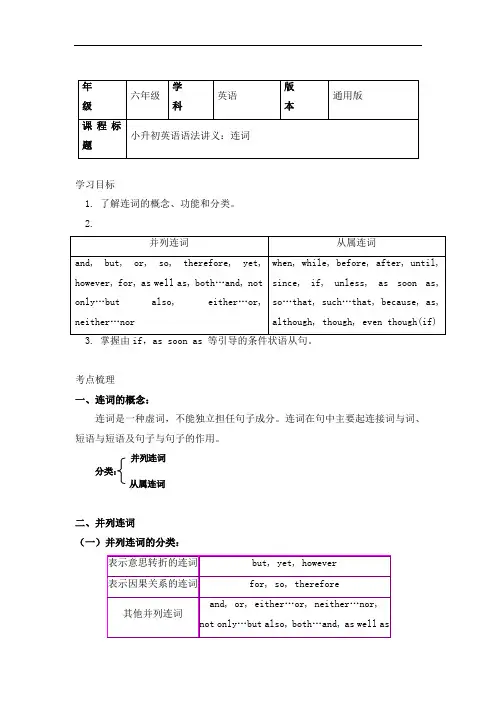
学习目标1. 了解连词的概念、功能和分类。
2.考点梳理一、连词的概念:连词是一种虚词,不能独立担任句子成分。
连词在句中主要起连接词与词、短语与短语及句子与句子的作用。
并列连词分类:从属连词二、并列连词(一)并列连词的分类:例句:He is only 12,but he is strong enough.他只有12岁,但他足够强壮。
She’ll be back either this week or next week. 她将在这周或下周回来。
I have a brother and sister. 我有一个哥哥和一个姐姐。
(二)并列连词的用法:1. 并列连词and和or:①and和or 是用得最多的并列连词,可以用于连接:a. 两个并列的动词:We were singing and dancing all evening. 整个晚上我们都在唱歌跳舞。
b. 名词、形容词等:This apple is big and red. 这个苹果又大又红。
Would you like fish or beef? 你想要点鱼还是牛肉?c. 两个并列的分句(句子):I said it and I meant it. 我说话算数。
②区别:and用于肯定句,or多用于否定和疑问句。
【提问】Do you want to live in the city __________the country?I won’t go to the park _______ the museum. I prefer to stay at home.③or用于肯定句,表示“否则”:例句:Don’t drive so fast, or you’ll have an accident. 别开这么快,不然你会出车祸。
【考题链接】(1)—I don't like chicken ___ fish.—I don't like chicken, ___ I like fish very much.A. and; andB. and; butC. or; butD. or;and答案:C解析:否定句中表并列关系时用or, but 在句中表转折。
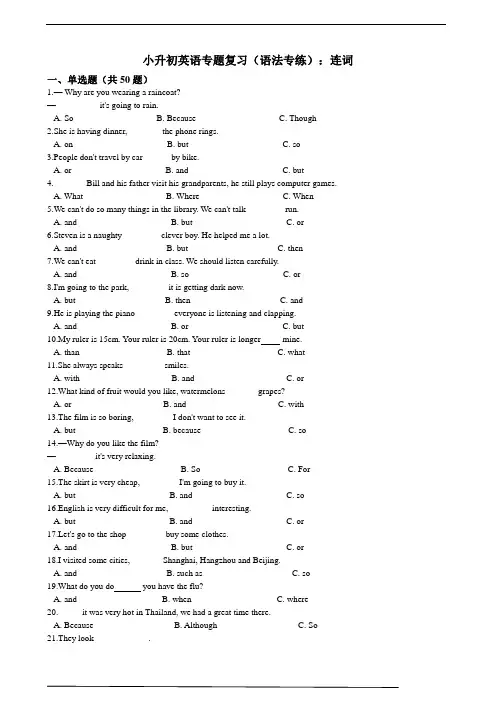
小升初英语专题复习(语法专练):连词一、单选题(共50题)1.— Why are you wearing a raincoat?— _________ it's going to rain.A. SoB. BecauseC. Though2.She is having dinner, _______ the phone rings.A. onB. butC. so3.People don't travel by car______ by bike.A. orB. andC. but4._______ Bill and his father visit his grandparents, he still plays computer games.A. WhatB. WhereC. When5.We can't do so many things in the library. We can't talk ________ run.A. andB. butC. or6.Steven is a naughty ________ clever boy. He helped me a lot.A. andB. butC. then7.We can't eat ________ drink in class. We should listen carefully.A. andB. soC. or8.I'm going to the park, ________ it is getting dark now.A. butB. thenC. and9.He is playing the piano ________ everyone is listening and clapping.A. andB. orC. but10.My ruler is 15cm. Your ruler is 20cm. Your ruler is longer mine.A. thanB. thatC. what11.She always speaks _________smiles.A. withB. andC. or12.What kind of fruit would you like, watermelons _______grapes?A. orB. andC. with13.The film is so boring, ________ I don't want to see it.A. butB. becauseC. so14.—Why do you like the film?— ________ it's very relaxing.A. BecauseB. SoC. For15.The skirt is very cheap, ________ I'm going to buy it.A. butB. andC. so16.English is very difficult for me, _________ interesting.A. butB. andC. or17.Let's go to the shop ________ buy some clothes.A. andB. butC. or18.I visited some cities,_______ Shanghai, Hangzhou and Beijing.A. andB. such asC. so19.What do you do you have the flu?A. andB. whenC. where20._____ it was very hot in Thailand, we had a great time there.A. BecauseB. AlthoughC. So21.They look ____________.A. healthy and youngB. health and strongC. health and young22.I usually go to the park and_________ a kite.A. flewB. flyC. flies23.Hong Kong is a modern city, _______ it is a great place to go shopping.A. butB. ifC. and24.Please call me _________ you get to Beijing.A. orB. whenC. because25.I was really sad _________ I lost my dog.A. soB. andC. because26.Which city do you like, New York _________ Rome?A. orB. andC. but27.Janet was late for school ________ she got up late.A. soB. ifC. because28.I've got a cat, _______ I don't like it.A. soB. butC. or29.There are many differences _______ this book _______ that book.A. between; inB. between; andC. between; of30.He likes to hear _______ not to say.A. orB. andC. but31.Mike sister is tall _____________ thin.A. withB. thanC. and32.My dog is bigger _____________ yours.A. withB. toC. than33.He likes music, _______ he can't sing well.A. butB. andC. so34.Every day, she sat at a coffee shop writing ______ the first book was finished.A. toB. untilC. but35.The man is poor, he feels happy.A. andB. orC. but36.—I want to see the film. It's interesting.—________ I am hungry now. I want to eat first.A. AndB. SoC. But37.—How can I get to the bookstore?—Go Straight .______turn right.A. ButB. SoC. Then38.Tom visited the farm ___ his family yesterday.A. withB. forC. and39.They are working on the farm,________it starts to rain.A. andB. butC. or40.I also work hard all day, _____ people never praise me.A. andB. orC. but41.I was very tired, very happy.A. andB. butC. or42.Winter is cold in many countries, these smart animals can spend it safely.A. butB. andC. or43.Mr. and Mrs. White are poor, ________ they are very happy.A. andB. soC. but44.I like water, I can't swim.A. andB. butC. or45."It's easy fun," said Anne.A. thenB. butC. and46.Tom is taller me.A. thanB. moreC. more than47.Which pen do you like, the white one the black one?A. orB. andC. but48.The city is modern __________ noisy now.A. andB. butC. to49.I had a race _______ John and Max.A. withB. orC. and50.I couldn't play football ________ swim well.A. orB. andC. with答案解析部分一、单选题1. B解:句意:—你为什么穿雨衣?—……要下雨了。
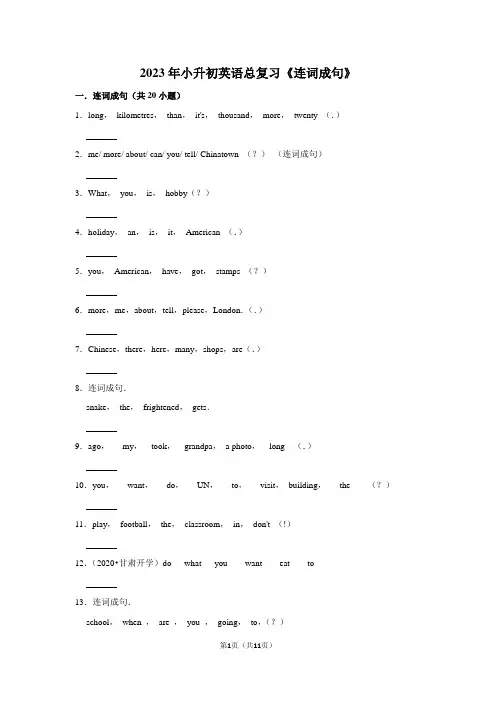
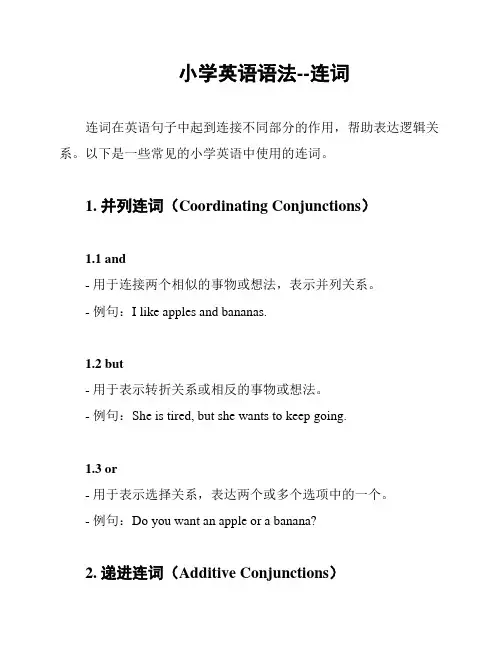
小学英语语法--连词连词在英语句子中起到连接不同部分的作用,帮助表达逻辑关系。
以下是一些常见的小学英语中使用的连词。
1. 并列连词(Coordinating Conjunctions)1.1 and- 用于连接两个相似的事物或想法,表示并列关系。
- 例句:I like apples and bananas.1.2 but- 用于表示转折关系或相反的事物或想法。
- 例句:She is tired, but she wants to keep going.1.3 or- 用于表示选择关系,表达两个或多个选项中的一个。
- 例句:Do you want an apple or a banana?2. 递进连词(Additive Conjunctions)2.1 also- 用于添加类似的事物或想法。
- 例句:She speaks English, and she also speaks French.2.2 furthermore- 用于提供更多信息或进一步解释。
- 例句:He is good at math. Furthermore, he excels in science.3. 转折连词(Concessive Conjunctions)3.1 although- 用于表示尽管某个条件存在,但结果与之相反。
- 例句:Although it was raining, we still went outside.3.2 however- 用于表示对前面说法的转折或相反观点。
- 例句:I wanted to go to the concert; however, I couldn't find tickets.4. 原因连词(Causal Conjunctions)4.1 because- 用于表示原因或解释。
- 例句:He couldn't go to the party because he was sick.4.2 so- 用于表达前因后果的关系。
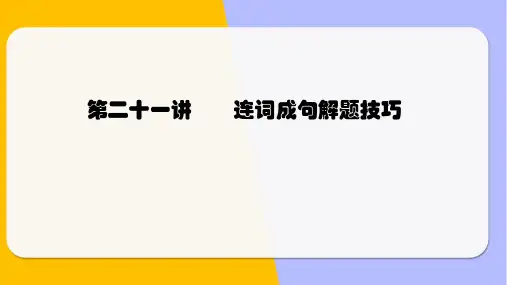
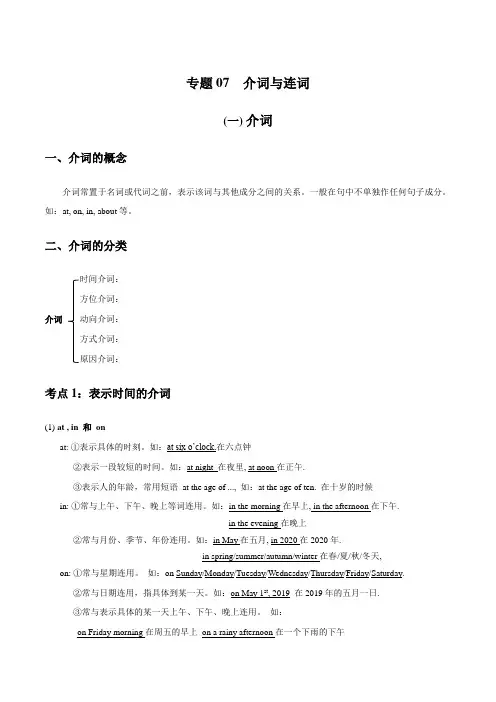
专题07 介词与连词(一)介词一、介词的概念介词常置于名词或代词之前,表示该词与其他成分之间的关系。
一般在句中不单独作任何句子成分。
如:at, on, in, about等。
二、介词的分类时间介词:方位介词:介词动向介词:方式介词:原因介词:考点1:表示时间的介词(1) at , in 和onat: ①表示具体的时刻。
如:at six o’clock.在六点钟②表示一段较短的时间。
如:at night 在夜里, at noon在正午.③表示人的年龄,常用短语at the age of ..., 如:at the age of ten. 在十岁的时候in: ①常与上午、下午、晚上等词连用。
如:in the morning在早上, in the afternoon在下午.in the evening在晚上②常与月份、季节、年份连用。
如:in May在五月, in 2020在2020年.in spring/summer/autumn/winter在春/夏/秋/冬天, on: ①常与星期连用。
如:on Sunday/Monday/Tuesday/Wednesday/Thursday/Friday/Saturday.②常与日期连用,指具体到某一天。
如:on May 1st, 2019 在2019年的五月一日.③常与表示具体的某一天上午、下午、晚上连用。
如:on Friday morning在周五的早上on a rainy afternoon在一个下雨的下午on the evening of May 5th在五月五日的晚上(2) before 和after 用来表示时间的先后顺序before:在……之前after:在……之后如:Spring comes before summer. 夏天之前是春天。
Come to my office after class. 放学后来我的办公室。
(3) from 用来表示从某段时间开始的动作,常与to 连用构成短语“from…to…”译为“从……到……”。
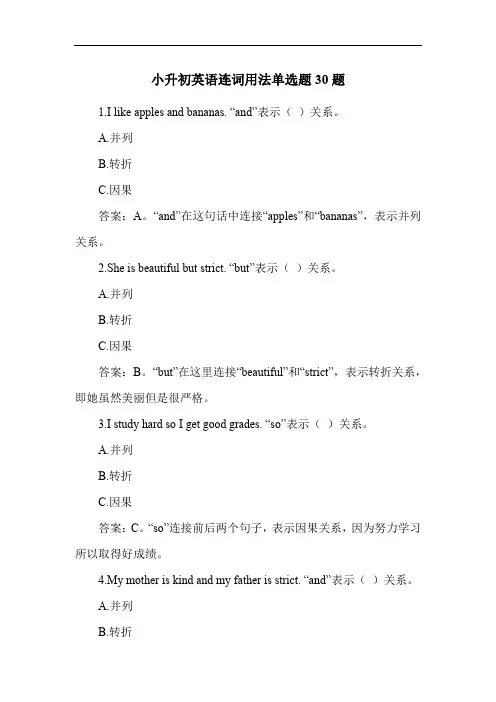
小升初英语连词用法单选题30题1.I like apples and bananas. “and”表示()关系。
A.并列B.转折C.因果答案:A。
“and”在这句话中连接“apples”和“bananas”,表示并列关系。
2.She is beautiful but strict. “but”表示()关系。
A.并列B.转折C.因果答案:B。
“but”在这里连接“beautiful”和“strict”,表示转折关系,即她虽然美丽但是很严格。
3.I study hard so I get good grades. “so”表示()关系。
A.并列B.转折C.因果答案:C。
“so”连接前后两个句子,表示因果关系,因为努力学习所以取得好成绩。
4.My mother is kind and my father is strict. “and”表示()关系。
A.并列B.转折答案:A。
“and”连接“mother is kind”和“father is strict”,表示并列关系。
5.I was tired but I finished my homework. “but”表示()关系。
A.并列B.转折C.因果答案:B。
“but”连接“tired”和“finished my homework”,表示转折关系,尽管累但还是完成了作业。
6.He is good at English and Chinese. “and”表示()关系。
A.并列B.转折C.因果答案:A。
“and”连接“English”和“Chinese”,表示并列关系。
7.I like reading and writing. “and”表示()关系。
A.并列B.转折C.因果答案:A。
“and”连接“reading”和“writing”,表示并列关系。
8.She is tall but thin. “but”表示()关系。
A.并列B.转折答案:B。
“but”连接“tall”和“thin”,表示转折关系,她虽然高但是瘦。
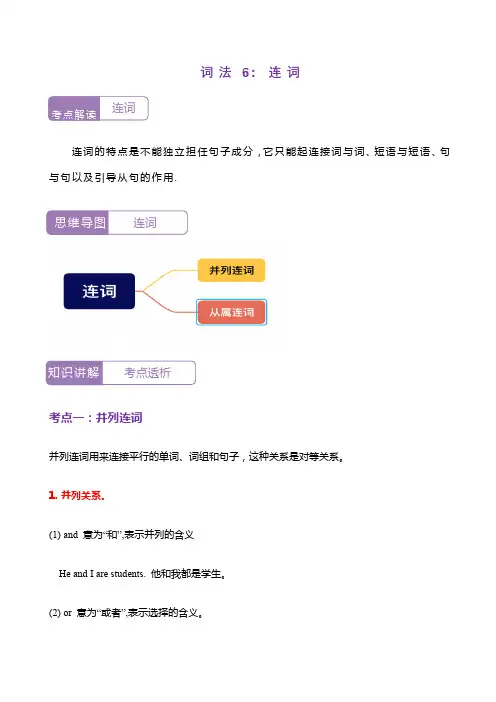
词法6: 连词连词的特点是不能独立担任句子成分,它只能起连接词与词、短语与短语、句与句以及引导从句的作用.考点一:并列连词并列连词用来连接平行的单词、词组和句子,这种关系是对等关系。
1. 并列关系。
(1) and 意为“和”,表示并列的含义He and I are students. 他和我都是学生。
(2) or 意为“或者”,表示选择的含义。
考点解读 连词思维导图 连词知识讲解考点透析Do you like juice or milk? 你喜欢果汁还是牛奶?Is he a farmer or a worker? 他是一名农民还是一名工人?2.转折关系。
but 意为“但是”,表示转折的含义。
I have a pen but no pencil. 我有一支钢笔,但没有铅笔Tom wants to go swimming, but Sam wants to play football. 汤姆想去游泳,但是萨姆想去踢足球。
3.因果关系。
(1)for 意为“因为”,表示因果的含义。
He is good at maths for he studies harder than others. 他擅长数学是因为他学习比别人更努力。
(2) so 意为“因此”,表示因果的含义。
He is ill so he can't go to school today. 他病了因此今天不能去上学。
我来练真题演练I、单项选择。
( ) 1.(2022·陕西汉中·小升初真题)Summer is coming.The days are getting longer ______ longer.A.but B.and C.so D.after( ) 2.(2022·河北唐山·小升初真题)Do you like this T-shirt __________ that T-shirt?A.to B.or C.and D.but( ) 3.(2022·山西太原·小升初真题)The swimsuit should not be too big ______ too small.A.and B.but C.or( ) 4.(2022·湖北黄冈·小升初真题)He is playing the suona, ______ the phone rings.A.or B.but C.with( ) 5.(2022·甘肃陇南·小升初真题)Our room was big ________ everything was very old.A.but B.because C.about( ) 6.(2022·安徽黄山·小升初真题)Today was a bad ______ good day for me.A.and B.but C.so参考答案:1.B【详解】句意:夏天来了。
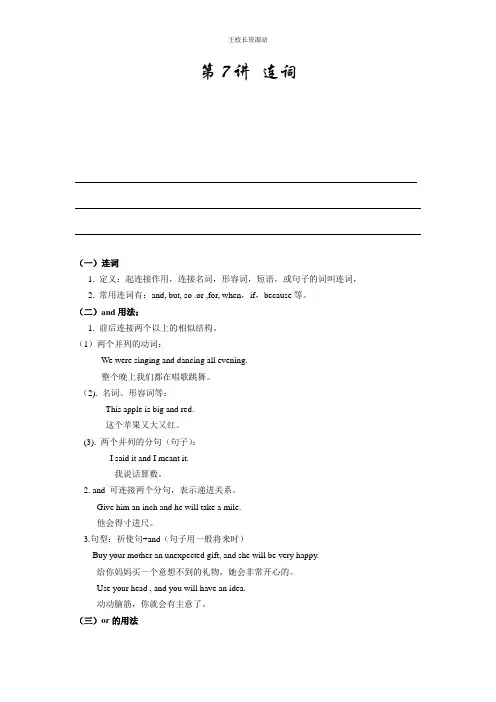
第7讲连词(一)连词1. 定义:起连接作用,连接名词,形容词,短语,或句子的词叫连词,2. 常用连词有:and, but, so .or ,for, when,if,because等。
(二)and用法;1. 前后连接两个以上的相似结构。
(1)两个并列的动词:We were singing and dancing all evening.整个晚上我们都在唱歌跳舞。
(2). 名词、形容词等:This apple is big and red.这个苹果又大又红。
(3). 两个并列的分句(句子):I said it and I meant it.我说话算数。
2. and 可连接两个分句,表示递进关系。
Give him an inch and he will take a mile.他会得寸进尺。
3.句型:祈使句+and(句子用一般将来时)Buy your mother an unexpected gift, and she will be very happy.给你妈妈买一个意想不到的礼物,她会非常开心的。
Use your head , and you will have an idea.动动脑筋,你就会有主意了。
(三)or的用法1. 连接两个以上的相似结构“或者”“还是”(1)动词:He will have dinner with his grandparents or stay at home.他或者是去陪祖父母吃饭,或者是呆在家里。
(2)名词He often has eggs or hamburgers for breakfast.他早饭或者是吃汉堡,或者是吃鸡蛋。
(3)形容词Is his new car blue or red?他的新车时红色的还是蓝色的?2. 连接两个句子“否则”“不然”句型:祈使句+or(句子用一般将来时)Study hard when you are at school ,or you will have a difficult future.上学的时候好好学,不然你的将来会很困难。
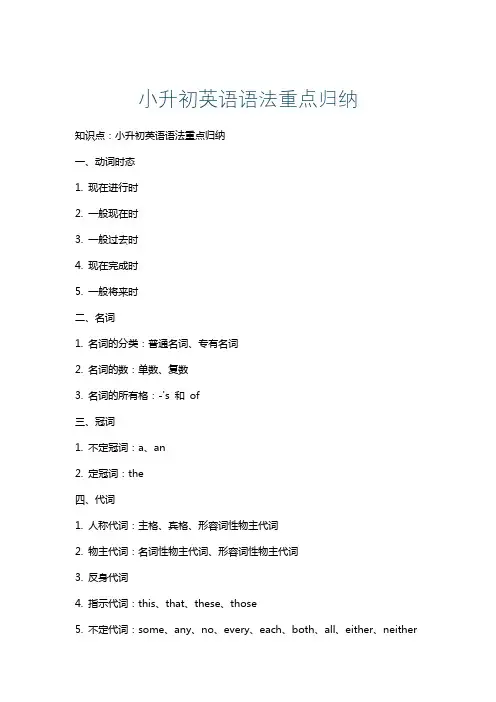
小升初英语语法重点归纳知识点:小升初英语语法重点归纳一、动词时态1. 现在进行时2. 一般现在时3. 一般过去时4. 现在完成时5. 一般将来时二、名词1. 名词的分类:普通名词、专有名词2. 名词的数:单数、复数3. 名词的所有格:-'s 和 of三、冠词1. 不定冠词:a、an2. 定冠词:the四、代词1. 人称代词:主格、宾格、形容词性物主代词2. 物主代词:名词性物主代词、形容词性物主代词3. 反身代词4. 指示代词:this、that、these、those5. 不定代词:some、any、no、every、each、both、all、either、neither等五、形容词和副词1. 形容词的比较级和最高级2. 副词的比较级和最高级3. 形容词和副词的转换六、介词1. 介词的分类:地点介词、时间介词、方向介词、方式介词等2. 介词短语七、连词1. 并列连词:and、or、but、nor、for、yet、so等2. 从属连词:because、if、although、though、until、after、before、since、lest等八、句子的类型1. 简单句2. 并列句3. 复合句4. 疑问句:一般疑问句、选择疑问句、特殊疑问句、反意疑问句5. 祈使句6. 感叹句九、被动语态1. 被动语态的构成:助动词be+过去分词2. 被动语态的时态:现在时、过去时、将来时十、主谓一致1. 名词作主语的主谓一致2. 代词作主语的主谓一致3. 不定代词作主语的主谓一致4. 并列主语的主谓一致十一、非谓语动词1. 动名词2. 分词:现在分词、过去分词3. 不定式十二、情景交际1. 问候与介绍2. 告别与感谢3. 道歉与许可4. 请求与建议5. 惊讶与祝贺本归纳文档涵盖了小升初阶段英语语法的重点知识点,旨在帮助学生巩固所学内容,为初中阶段的学习打下坚实基础。
在学习过程中,请注意理解各个语法点之间的联系,加强练习,提高英语水平。
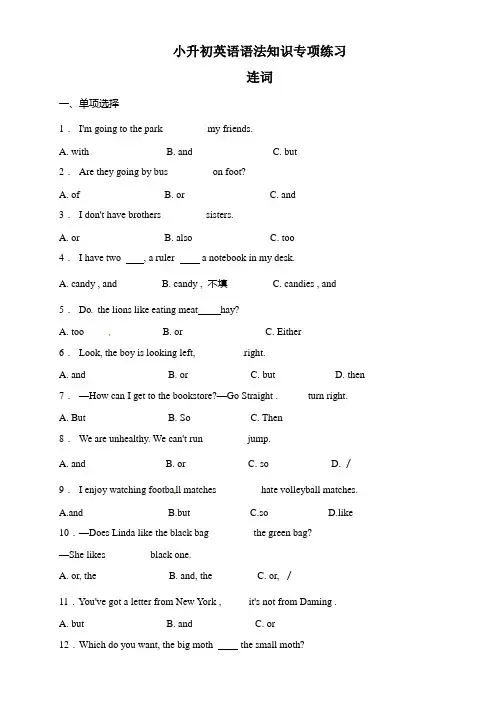
小升初英语语法知识专项练习连词一、单项选择1.I'm going to the park ________ my friends.A. withB. andC. but2.Are they going by bus ________ on foot?A. ofB. orC. and3.I don't have brothers ________ sisters.A. orB. alsoC. too4.I have two , a ruler a notebook in my desk.A. candy , andB. candy , 不填C. candies , and 5.Do the lions like eating meat hay?A. tooB. orC. Either6.Look, the boy is looking left, ________ right.A. andB. orC. butD. then 7.—How can I get to the bookstore?—Go Straight .______turn right. A. But B. So C. Then8.We are unhealthy. We can't run ________ jump.A. andB. orC. soD. /9.I enjoy watching footba ll matches ________ hate volleyball matches.A.andB.butC.soD.like 10.—Does Linda like the black bag ________ the green bag?—She likes ________ black one.A. or, theB. and, theC. or, /11.You've got a letter from New York , _____it's not from Daming .A. butB. andC. or12.Which do you want, the big moth the small moth?A. andB. orC. /13.Tom visited the farm ___ his family yesterday.A. withB. forC. and14.Do you go to bed at 9 at 9:30 in the evening?A. andB. orC. but15.You're taller ______ your brother.A. thanB. andC. more16.I like ice cream, ________ it's sweet.A. andB. butC. because17.The nature park is __________ beautiful.A. becauseB. soC. but18.I like the room, ________ it is not big or bright.A.becauseB.soC.but19.Miss Li is busy ________ she still helps u s a lot.A. butB. andC. orD. so 20.I don't like winter it's too cold.A. andB. becauseC. so21.I like chilies ________ they are spicy.A. butB. becauseC. soD. and 22.Mike is tall__________ strong.A. andB. orC. but23.—________ doesn't Alice go to school?—________ she is ill.A.Why, BecauseB.Because, WhyC.How, Yes24.My mother can drive a car, she can ride a bike, too.A. andB. butC. or25.I like noodles _____ I don't like rice.A. haveB. orC. but26.There aren't any trees ________ flowers in the garden.A. orB. andC. soD. but27.—I want to see the film. It's interesting.—________ I am hungry now. I want to eat first.A. AndB. SoC. But28.________ hat do you like, the brown one ________ the black one?A. Which, andB. What, orC. Which, or29.I don't live in China, __________ I like Chinese.A.andB.butC.so30.I like eating ice cream, _______I eat a little at a time.A. soB. orC. but(参考答案)一、单项选择1.【答案】A【解析】句意:我打算......我的朋友们去公园。
小学英语语法-连词连词是连接两个句子或词语的词汇,它能够帮助我们更加准确和流畅地表达我们的意思。
下面是一些小学英语中常见的连词及其用法。
并列连词(Coordinating Conjunctions)并列连词用于连接相同类型的词语、词组或句子。
常见的并列连词有以下几种:- and:用于连接相似、相同或并列的词语或句子。
例如:Tom likes apples and bananas.and:用于连接相似、相同或并列的词语或句子。
例如:Tom likes apples and bananas.- but:用于表示相对或相反的情况。
例如:She is tired, but she wants to keep playing.but:用于表示相对或相反的情况。
例如:She is tired, but she wants to keep playing.- or:用于提供选择或对比的情况。
例如:Do you want tea or coffee?or:用于提供选择或对比的情况。
例如:Do you want tea or coffee?从属连词(Subordinating Conjunctions)从属连词用于连接主从复合句。
它们引导从句(subordinate clause)并指示从句与主句之间的关系。
常见的从属连词有以下几种:- if:表示条件。
例如:I will go to the park if it's not raining.if:表示条件。
例如:I will go to the park if it's not raining.- when:表示时间。
例如:I will call you when I arrive at the station.when:表示时间。
例如:I will call you when I arrive at the station.连接副词(Conjunctive Adverbs)连接副词是用来连接两个句子或句子的部分,并指示它们之间的关系。
小升初英语语法学问专项练习介词与连词一、单项选择1.Is it a man ____a woman?A. andB. orC. with2.It’s time ____breakfast.A. ofB. atC. for 3.Welcome________my home.A.to B.too C.two 4.Look at this photo ____her.A. withB. ofC. for5.I was born ____ the year of the tiger.A. atB. onC. in6.How did you go to Shanghai?—We went there ____air.A. byB. inC. at7.My parents like to go ______ a walk.A. toB.atC. for 8.Mocky had a birthday gift Ken.A onB inC for9.She buy a card ______ me.A .on B. to C. for10.— What is forty ______ twenty?— It is sixty.A. andB. orC. so11.He gave a box of chocolate _____ me.A. fromB. toC. for 12.Please send an email _____me.A.toB.forC.on 13.He is wearing a blue suit ____a silver tie.A. withB. inC. of 14.---W here is the teachers’ office?---It’s _________ the second floor.A.onB.inC.near 15.My family have been living in Chengdu ______ Iwas born.A. forB. whileC.sinceD.when 16.Are you going to take part ________ the meeting?A. onB. atC. in 17.The hospital is next____the museum。
@九、连接词1、连词的含义:连接词与词、短语与短语、或引导从句的词叫连接词,它是虚词,所以不能单独担任句子成分。
2、连词的分类:连词分为并列连接词和从属连接词两种。
1)并列连接词连接并列的词、短语、从句或句子。
常见的并列连接词有:and(和), but(但是),or(或者,否则), nor(也不), so(所以), however(然而,无论如何), for(因为), still(可是), as well as(也), both..and...(...和...), not only ...but also...(不但…而且…),either… or…(或…或…), neither… nor… (既不…也不…) 等。
2)从属连接词用于引导从句, 常见的从属连接词有:when(当…时候), while(正当…时候),after(在…之后), before(在…之前), since(自从), until(直到), although/though(虽然), if(假如), as(如…一样;由于), as …as…(和…一样), as far as(就…而言), as long as(只要), as soon as(一…就…), even if(即使), because(因为), unless (除非), than(比…), whether (是否…), in order that…(为了), so…that…(如此…以致), so that…(以便), now that…(现在既然), by the time…(到…时候), every time…(每当), as if…(仿佛),no matter when(或whenever)(无论何时),no matter where(或wherever)(无论在哪里)等。
3、常用并列连词用法1) “and”1. He got up and left the room.)2. He went to Kunming and I went to Harbin last year.特别用法: 句型“祈使句, and …”= If you…, you will…3. Work hard, and you will do well in the exam.2)“or”1. Tom or I am right. (or连接两个名词或代词做主语时谓语动词依照后面的词而定)2. Would you like coffee or tea (选择)特别用法: 句型“祈使句, or…”= If you don’t …, you will…3. Hurry up, or you will miss the bus. (否则)-3)“but”1. She is sixty, but she still looks young.2. She is tired but happy.3. I came here not for myself but for my son.4. Mary likes piano but Tom doesn’t (like可以省略).4)“for”1. I went to sleep soon, for I was very tired.[2. The sun has risen,for the birds are singing.比较:表示原因, 译为”因为”, 表示说明、解释。
小升初英语重要语法知识点总结1. 词性和句子结构在学习英语语法知识时,首先要了解不同词性的基本特征和句子的基本结构。
下面是一些常见的词性和句子结构的介绍。
1.1 词性•名词:用来表示人、事、物、地方和抽象概念等。
名词的单数形式和复数形式、所有格以及名词的性质和功能都是需要掌握的内容。
•动词:表示动作、状态或存在的词。
除了学习动词的基本形式、过去式和过去分词外,还需要了解动词的时态和语态等。
•形容词:用来描述名词的性质或特征。
形容词有比较级和最高级的形式,也有不规则变化的形容词。
•副词:对动词、形容词、副词、句子等进行修饰。
除了学习副词的基本形式,还需要了解副词的比较级和最高级形式。
•代词:代替名词或名词性短语的词。
代词分为人称代词、物主代词、指示代词、疑问代词和不定代词等。
•介词:用来表示时间、空间、原因、关系等概念。
介词通常用于表示动词动作发生的地点或时间,在句子中起连接作用。
•连词:用于连接句子、短语或词语。
常见的连词有并列连词、从属连词和关联连词等。
1.2 句子结构英语句子的基本结构包括主语、谓语、宾语等成分。
了解句子结构可以帮助我们正确理解和使用不同的句子。
•主语:句子中进行动作的主体。
•谓语:表示主语动作或状态的动词。
•宾语:动作的承受者或受事者。
•表语:用来对主语进行说明、补充或描述的成分。
•状语:对动词、形容词或副词进行修饰的成分。
•定语:修饰名词或代词的成分。
2. 时态与语态2.1 时态•一般现在时:表示经常性、习惯性或客观现实的动作。
例如:I eat breakfast every day.•一般过去时:表示过去某个时间发生的动作或状态。
例如:I went to the park yesterday.•一般将来时:表示将来发生的动作或状态。
例如:I will go to the movie theater tomorrow.•现在进行时:表示现在正在进行的动作。
例如:I am studying English now.•过去进行时:表示过去某个时间正在进行的动作。
连词(小初考点差异及连接)【学校连词考点聚焦】一.用or, and, but, so, because 完成句子。
1. Nick was very tired ________ he was very happy.2. His father never smokes ________ drinks.3. He is ill, he can’t go to school.4. Our classroom is clean ________ tidy.5. Lucy worked hard at English ________ she got first in the English exam.6. People can’t live without air ________ water.7. Hurry up, ________ we will be late.8. We can’t go out now, it is raining outside.9. I like drawing, ________ I don’t like singing.10. I like my mother ________ father.二1. I don’t like pork ________ beef.A. andB. orC. butD. so2. —Would you like to watch TV tonight?— I’d like to, ________ I have to do my homework.A. andB. orC. soD. but3. Put your coat on ________ you will be cold.A. andB. orC. soD. but【学校连词考点聚焦】考点清单考点一并列连词的用法并列连词是用来连接语法地位相同的单词、短语以及句子的连词。
并列连词主要分为表示并列关系、转折关系、因果关系及选择关系的并列连词。
小升初语法知识点总结归纳一、名词1.名词的定义名词是表示人、事、物、地点、时间、概念等的名称。
名词分为专有名词和普通名词。
2.名词的数名词有单数和复数之分。
在普通名词中,有些名词变复数时,只加-s,有些名词变复数时,要加-es,还有些名词变复数时,要变换词形。
3.名词的所有格名词所有格的构成:名词后加-apostrophe + s。
4.名词的性名词分为男性名词、女性名词和中性名词,有些名词没有性区别。
5.名词的功能名词可以作主语、宾语、定语、表语等。
二、代词1.代词的定义代词是用来代替名词的词。
2.人称代词人称代词分为第一人称、第二人称和第三人称,代表说话的人、被说话的人和谈论的人。
3.物主代词物主代词分为形容词性物主代词和名词性物主代词,用来表示所属关系。
4.指示代词指示代词用来指示人或事物的方位或范围。
5.疑问代词疑问代词用来提问。
6.不定代词不定代词用来指代不确定的人或事物。
7.相互代词相互代词用来指相互之间的关系。
三、动词1.动词的定义动词是表示动作或状态的词。
2.动词的时态动词有一般现在时、一般过去时和一般将来时等,表示动作发生的时间。
3.动词的语态动词有主动语态和被动语态,表达动作执行者与承受者的关系。
4.动词的情态情态动词表示说话人对动作发生的看法和态度。
5.动词的语气动词的语气有陈述语气、祈使语气和虚拟语气等。
四、形容词1.形容词的定义形容词是用来修饰名词的词。
2.形容词的级形容词分为原级、比较级和最高级,表示事物的程度或比较关系。
3.形容词的位置形容词可以位于名词之前或之后。
五、副词1.副词的定义副词是修饰动词、形容词、副词或整个句子的词。
2.副词的种类副词可以分为时间副词、地点副词、方式副词和程度副词。
六、介词1.介词的定义介词是用来表示名词或代词与其他词之间的关系的词。
2.介词短语介词短语是由介词和它的宾语或补语构成。
七、连词1.连词的定义连词是用来连接词、短语或句子的词。
九、连接词1、连词的含义:连接词与词、短语与短语、或引导从句的词叫连接词,它是虚词,所以不能单独担任句子成分。
2、连词的分类:连词分为并列连接词和从属连接词两种。
1)并列连接词连接并列的词、短语、从句或句子。
常见的并列连接词有:and(和), but(但是), or(或者,否则), nor(也不), so(所以), however(然而,无论如何), for(因为), still(可是), as well as(也),both..and...(...和...), not only ...but also...(不但…而且…), either… or…(或…或…), neither… nor…(既不…也不…) 等。
2)从属连接词用于引导从句, 常见的从属连接词有:when(当…时候), while(正当…时候),after(在…之后), before(在…之前), since(自从), until(直到), although/though(虽然), if(假如),as(如…一样;由于), as …as…(和…一样), as far as(就…而言), as long as(只要), as soon as(一…就…), even if(即使), because(因为), unless (除非), than(比…), whether (是否…), in orderthat…(为了), so…that…(如此…以致), so that…(以便), now that…(现在既然), by the time…(到…时候), every time…(每当), as if…(仿佛),no matter when(或whenever)(无论何时),no matterwhere(或wherever)(无论在哪里)等。
3、常用并列连词用法1) “and”1. He got up and left the room.2. He went to Kunming and I went to Harbin last year.特别用法: 句型“祈使句, and …”= If you…, you will…3. Work hard, and you will do well in the exam.2)“or”1. Tom or I am right. (or连接两个名词或代词做主语时谓语动词依照后面的词而定)2. Would you like coffee or tea? (选择)特别用法: 句型“祈使句, or…”= If you don’t …, you will…3. Hurry up, or you will miss the bus. (否则)3)“but”1. She is sixty, but she still looks young.2. She is tired but happy.3. I came here not for myself but for my son.4. Mary likes piano but Tom doesn’t (like可以省略).4)“for”1. I went to sleep soon, for I was very tired.2. The sun has risen,for the birds are singing.比较:表示原因, 译为”因为”, 表示说明、解释。
与because不同,用于解释某事的原因、动机,强调因果关系。
用语回答why引导的问句。
5)“both …and …”1. Both you and I are Chinese.2. I like both sports and music.特别用法: both…and…的否定句表示部分否定。
3. He can’t play both tennis and volleyball. 它并不是既会打网球又会打排球。
6) either…or…, neither…nor…1. Either you or she is wrong.2. Can you speak either French or English?3. Neither the teacher nor the students like this song.特别提示: 用either…or…, neither…nor…连接两个名词或代词做主语时谓语动词依照后面的词而定比较: both…and…, either…or…, neither…nor…的相互关系:肯定句: 1. I like both A and B.否定句: 2. I don’t like both A and B.= I like either A or B.否定句: 3. I don’t like either A or B.= I like neither A nor B.7)“Not only…but also…”1. Not only you but also your father is coming.(连接两个名词或代词做主语时谓语动词依照后面的词而定)2. She learns not only English but also Japanese.4、连词的辨析1)because、as、since、for的用法:because(因为)表示原因的语气最强, 常表示必然的因果关系,从句一般放在主句后面;另外, 回答why的问句只能用because. as(因为)表示一般的因果关系,语气比because弱, 说明比较明显的原因, 它引导的从句可以放在句首也可以放在句尾。
Since (既然)表示对方已经知道、无需加以说明的原因或事实。
for(因为)是并列连词,语气较弱, 用来补充说明理由或提供一种解释。
如:He is not at school today because he is seriously ill.(他今天没有上学因为他病得厉害)As all of you have got here, now, let’s go to the zoo.(既然大伙儿都到了我们就去动物园吧)I will ask Lin Tao to go with me since you are very busy.(既然你很忙我就叫林涛和我一起去吧)We must be off now for the match starts at 7:00.(我们得走了因为比赛在七点开始)2)if、whether的区别:表示“是否”时, if和whether同义, 引导宾语从句, 另外, whether还可以引导主语从句、表语从句(以及同位语从句)等名词性从句或者让步状语从句;而if还可以表示“如果”,引导条件状语从句, (主句与从句遵循主将从现的原则)。
如:I don’t know if/whether he will arrive on time.(我不知道他是不是会按时到达)I will ring you up if he arrives on time.(如果他按时到达我会给你打电话的)【注意】:下列情况只能用...if..:...whether.......不能用①引导主语从句②引导表语从句③引导从句作介词宾语④引导不定式短语⑤引导让步状语从句⑥在动词⑦在wonder / not sure之后⑧在if与whether含义易混时。
如:Whether it is a fine day next Sunday is still a question.(下个星期天是不是个好天还是个问题)(引导主语从句)Please ask him whether to go there with a raincoat or not.(请问一下带不带雨衣去那儿)(作动词的宾语)Hainan is the place to be, whether it’s summer or winter.(海南是个该去的地方无论冬夏)(引导让步状语从句)Please let me know whether you need my help.(请告诉我你是否需要我的帮助)(引导宾语从句)(如果换成if则还可能表示“如果你需要我的帮助请告知”)3)while、when、as的用法区别:while常表示一个较长的动作, 它引导的从句动作与主句的动作是同时发生的、是平行的;when可以表示较短的动作也可以表示较长的动作, 主句和从句的动作可以同时发生也可以先后发生;as与上两词同义, 可替换while和when, 表示主句和从句的动作同时发生, 常译为“一边……一边……”。
如:Please do not trouble me while I am writing my homework.(我写作业时请不要打扰我)I’ll go home when I have finished my job.(我干完了活儿就回去)They were running quickly across the road when they heard the sound of a truck coming.(他们正快速地穿过马路忽然听到了卡车开来的声音)As we walked in the dark street, we sang songs and talked loudly.(当我们在黑洞洞的街上走路时我们高声地唱歌说话)4)till/until与not…till/until的区别:前者表示一个延续性的动作, 后者表示一个才开始的动作。
如:I will stay here and watch the baby until you return.(我会呆在这里看着娃娃直到你回来)(stay这个动作一直进行到你return)They won’t go on working until they get what they think is reasonable.(他们要到获得了他们认为合理的东西时才会继续干下去的)另外,till与until基本可以互换, 但是在句首时只能用until, 不能用till. 如:Until the last minute of the match we kept playing.(我们坚持到比赛的最后一分钟)Not until he had finished his work did he go home.(直到做完工作他才回家)(倒装句)5)though与although的区别:两个词都表示“虽然”,均不可以与but同时使用, 但在句中可加still或yet连用。
although“尽管、虽然”仅作连词, 比较正式, 一般可以换为though;though“虽然、尽管、即使”,还可以与even连用(=even if), 表示“即使、纵然”,作副词时意思是“然而、不过”,不能放在句首。